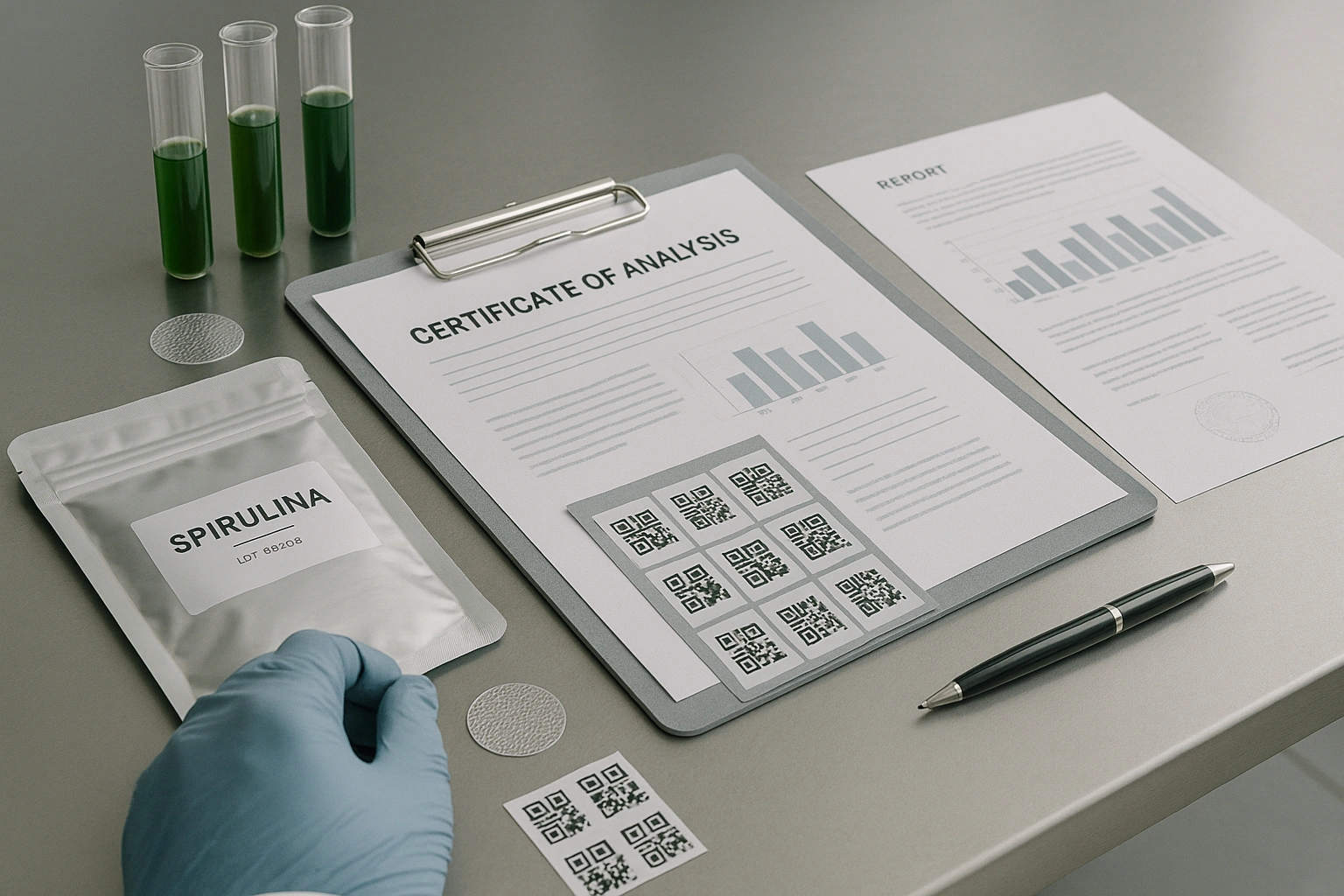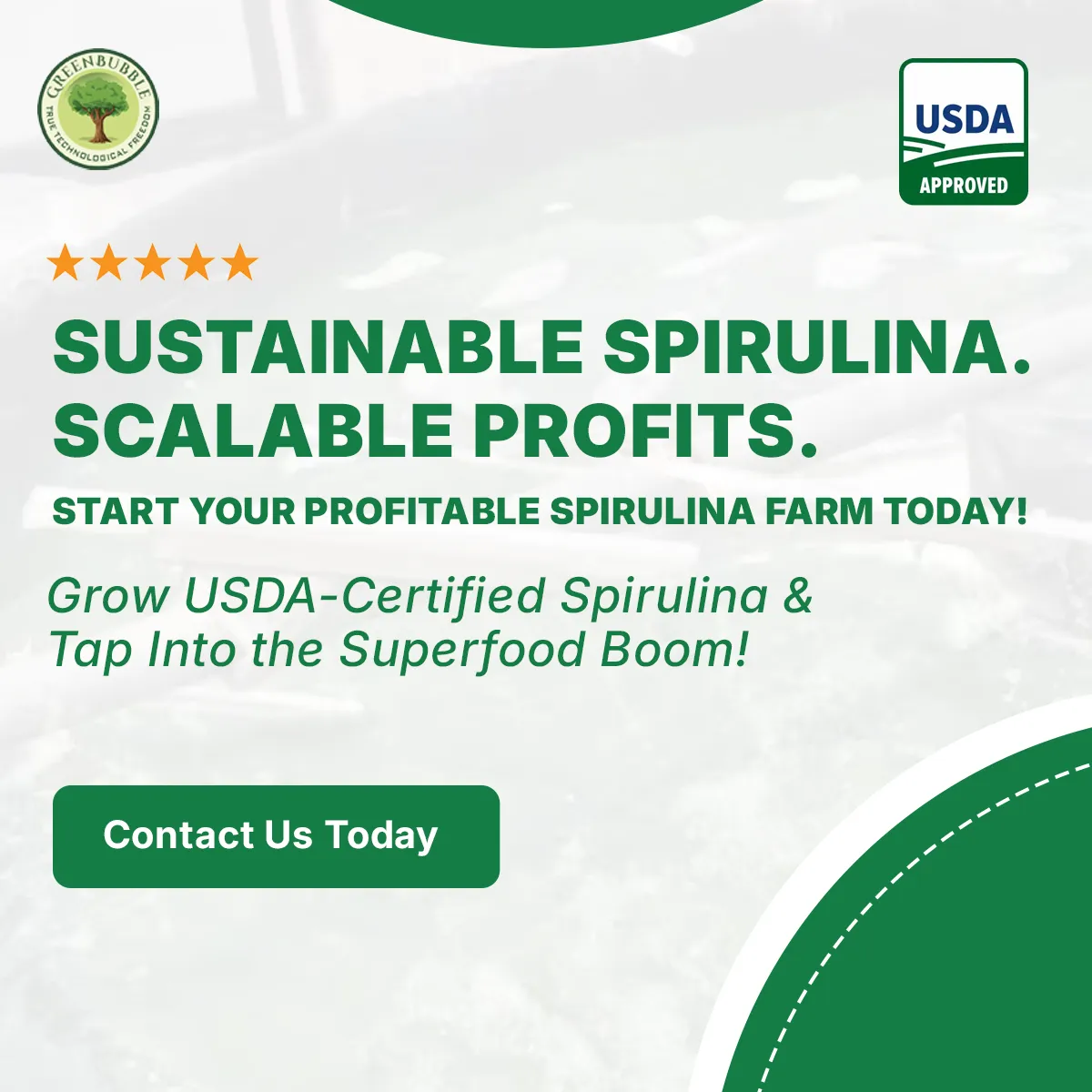Spirulina may be a globally trending superfood, but exporting it successfully hinges on one non-negotiable factor – certification. No matter how nutrient-rich or well-packaged your spirulina is, international markets will shut the door without documented proof of quality, safety, and traceability. Certifications do more than satisfy regulations – they establish credibility, open doors to premium buyers, and justify higher pricing.
In this in-depth guide, we’ll explore the different types of certifications required for spirulina exports, how they influence buyer decisions, what timelines and costs are involved, and how to set your unit up for audit success.
1. What Certifications Do You Need to Export Spirulina?
Different certifications serve different purposes – legal clearance, food safety assurance, organic compliance, or market positioning.
A. USDA Organic / EU Organic / India Organic
- Validates use of chemical-free, organic inputs and growing conditions
- Required for entry into most health-conscious retail and nutraceutical markets
- Must involve a yearly audit and traceability logs for organic batches
- Adds a “clean label” advantage to attract vegan, health, and premium-conscious buyers
B. FSSAI License (India) / FDA Registration (USA)
- Mandatory food business license for processing units
- Required for legal food export from India and for customs approval in importing countries
- Ensures adherence to local food safety and labeling laws
C. ISO 22000 / FSSC 22000
- Food safety management systems covering SOPs, hazard control (HACCP), and sanitation practices
- Boosts trust with private-label importers, nutraceutical companies, and overseas distributors
- Often demanded by large B2B aggregators
D. COA (Certificate of Analysis)
- Scientific proof of product purity and consistency
- Lists parameters like protein %, moisture %, phycocyanin content, microbial count, and heavy metals
- Must be batch-linked and verified by a certified laboratory
- Enhances buyer confidence and pricing power
E. Phytosanitary Certificate
- Issued by the Plant Quarantine Department for every export batch
- Declares the absence of plant diseases and confirms the export’s sanitary status
2. Why Export Buyers Demand Certifications
International buyers operate under stringent import regulations, especially in markets like the USA, EU, Japan, and the UAE. They demand certifications because:
- They ensure traceability from pond to packaging
- They mitigate legal and health risks for retailers and importers
- Organic and ISO certifications help in meeting country-specific labeling laws
- B2B buyers often require documentation for internal audits and resale approval
Without these, buyers may outright reject the shipment, request a steep discount, or blacklist your facility.
3. Pricing Advantage of Certified Spirulina
Certifications aren’t just about compliance – they’re ROI multipliers. Here’s how pricing shifts with key certifications:
- USDA Organic: Adds ₹200–₹500/kg premium
- ISO 22000 + Organic: Combined, they can fetch ₹400–₹1000/kg more
- COA-backed & GMP Processed: Retail-ready spirulina with proper documentation sells at ₹1000–₹1500/kg higher, especially in D2C, Amazon, or pharmacy chains
Certified Exporters Can Access:
- Premium grocery and wellness chains
- Online clean-label platforms in the US and Europe
- Large nutraceutical manufacturers
- Government and NGO bulk procurement programs
4. Certification Timeline & Cost Breakdown
Understanding timelines and costs helps you plan better. Here’s a realistic estimate:
Certification Timeline:
- USDA/EU Organic: 4–6 months (includes farm visit, soil & water test, documentation)
- FSSAI License: 15–30 days (basic application, inspection)
- ISO/FSSC Audit: 2–4 months (with pre-audit preparation)
- COAs: Per batch (typically 5–7 days turnaround)
Cost Estimates:
- Organic Certification: ₹1,75,000–₹3 lakh annually
- ISO 22000: ₹80,000–₹1.5 lakh initial setup, audit fees separate
- Lab Testing (COA): ₹15000–₹30000 per batch depending on panel
These are recovered quickly once you sell certified spirulina at higher margins.
5. How to Prepare Your Unit for Certification Success
Before inviting auditors or submitting documents, ensure your facility is compliance-ready.
- Implement standard operating procedures for cultivation, drying, packaging, and lab testing
- Install a basic spirulina lab with tools for protein, moisture, and microbial testing
- Ensure clear demarcation of hygiene zones, foot dips, and staff protective gear
- Train your team in record-keeping, traceability, and corrective actions
- Conduct internal mock audits using checklists before applying
- Digitize batch logs and link test results to production batches
Related Read: Export-Ready Spirulina: Setting Up a Compliant Unit
6. Mistakes to Avoid During Certification Process
Many first-time exporters lose months due to avoidable missteps:
- Using unfiltered or surface water during cultivation
- Inconsistent input records – especially carbonates, micronutrients
- Reusing contaminated packaging materials
- Not maintaining batch-level traceability (lab tests, harvest logs)
- Letting certifications lapse due to missed audit dates
One compliance error can not only cost you the certification but also lead to rejected shipments and permanent buyer loss.
FAQ
Q1: Can I export spirulina without organic certification?
Technically yes – but only to buyers who accept non-organic raw spirulina. You’ll miss premium health and export-focused customers.
Q2: What if I sell bulk powder, not consumer packs?
You still need COAs and food-grade licenses like FSSAI. ISO helps with institutional buyers.
Q3: How do international buyers verify my certificates?
They check certificate numbers with issuing bodies, request digital copies, and sometimes do background checks on your facility.
Q4: Do I need all the certifications upfront?
Start with mandatory ones (FSSAI, COA) and build up (Organic, ISO) based on market demand.
Q5: Will certification help me get export orders?
Yes. Buyers often search for suppliers by certification first, not just price.
Conclusion
Certification is not just a checkbox – it’s your passport to global spirulina markets. It builds credibility, unlocks new price tiers, ensures repeat buyers, and helps you stand out in an increasingly saturated space.
If you’re planning to go global, certifications like USDA Organic, ISO 22000, and COA-backed systems are non-negotiable investments in your brand’s future.


